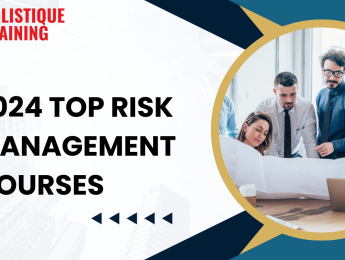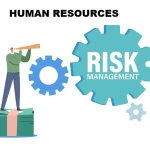Introduction
Risk management is a vital discipline essential for navigating uncertainties and optimizing opportunities in today's global business landscape. It involves identifying, assessing, and mitigating risks that could impact organizational goals and objectives. By implementing effective risk management strategies, organizations can enhance decision-making, allocate resources efficiently, and ensure compliance with regulatory standards. This article explores the fundamental principles, strategies, and significance of risk management in fostering resilience, innovation, and sustainable growth across diverse industries.
1. Enterprise Risk Management by Coursera
Summary: This course focuses on the fundamentals of enterprise risk management (ERM), covering various frameworks, strategies, and tools essential for identifying, assessing, and mitigating risks in an organization.
Duration: 4 weeks (approx. 20 hours)
Language: English
Level: Intermediate
What does an Enterprise Risk Management Course teach you? The course teaches you how to develop and implement a comprehensive risk management strategy within an organization, covering risk identification, assessment, mitigation, and monitoring.
Who should take the Enterprise Risk Management course? Professionals in risk management, finance, audit, and compliance, as well as managers and executives responsible for strategic decision-making, will benefit from this course.
Why should take the Enterprise Risk Management course? Taking this course helps professionals enhance their skills in managing risks, ensuring organizational resilience, and supporting informed decision-making processes.
2. Risk Management for Projects by edX
Summary: This course provides a deep dive into risk management practices specifically for project management, focusing on identifying, analyzing, and responding to project risks.
Duration: 6 weeks (approx. 30 hours)
Language: English
Level: Intermediate
What does a Risk Management for Projects Course teach you? The course teaches you how to systematically identify and manage risks in project settings, ensuring project success and minimizing potential negative impacts.
Who should take the Risk Management for Projects course? Project managers, team leaders, and professionals involved in project planning and execution should take this course.
Why should take the Risk Management for Projects course? This course is essential for those looking to improve project outcomes, reduce uncertainties, and increase the likelihood of project success through effective risk management techniques.
3. Financial Risk Management by Udemy
Summary: This course covers the principles of financial risk management, including market risk, credit risk, and operational risk, providing tools and techniques for effective financial risk assessment and control.
Duration: 5 weeks (approx. 25 hours)
Language: English
Level: Advanced
What does a Financial Risk Management Course teach you? The course teaches you how to identify, measure, and manage financial risks using various financial instruments and risk management frameworks.
Who should take the Financial Risk Management course? Financial analysts, risk managers, and professionals in banking, insurance, and investment industries should take this course.
Why should take the Financial Risk Management course? This course is vital for professionals aiming to safeguard financial assets, optimize risk-return profiles, and enhance financial decision-making processes.
4. Operational Risk Management by LinkedIn Learning
Summary: This course focuses on operational risk management, teaching methods to identify, assess, and mitigate risks associated with business operations to ensure continuity and resilience.
Duration: 3 weeks (approx. 15 hours)
Language: English
Level: Intermediate
What does an Operational Risk Management Course teach you? The course teaches you how to manage operational risks through risk assessment techniques, control measures, and effective risk communication strategies.
Who should take the Operational Risk Management course? Operations managers, risk management professionals, and anyone responsible for business continuity and operational efficiency should take this course.
Why should take the Operational Risk Management course? Taking this course helps professionals reduce the impact of operational disruptions, enhance process efficiency, and ensure business continuity through effective risk management practices.
5. Project Risk Management, Effective Decision-Making & Compliance at Holistique Training
Summary: This course covers essential skills for managing project risks, enhancing decision-making, and ensuring compliance. Participants will learn to identify areas for continuous improvement, evaluate and compare current and future processes, and effectively communicate projects to gain stakeholder support. The course also teaches how to manage budgets, create cost-benefit analyses, accept leadership responsibilities, implement performance management structures, and understand regulatory compliance to develop action plans that adhere to standards.
Duration: 5 days
Language: English
Level: Advanced
What does a Project Risk Management, Effective Decision-Making & Compliance Course teach you? The course teaches essential skills for managing project risks, enhancing decision-making, and ensuring compliance. It covers identifying continuous improvement areas, evaluating and comparing processes, effective project communication, budget management, cost-benefit analyses, leadership, performance management, and regulatory compliance.
Who should take the Project Risk Management, Effective Decision-Making & Compliance course? Project managers, team leaders, compliance officers, and professionals involved in project planning and execution, as well as those responsible for ensuring regulatory compliance, should take this course.
Why should take the Project Risk Management, Effective Decision-Making & Compliance course? This course helps professionals improve project outcomes by effectively managing risks, making informed decisions, ensuring compliance, and gaining stakeholder support. It also enhances budget management, cost-benefit analysis skills, leadership abilities, and performance management, contributing to overall project success and organizational resilience.
Table: Summary of 2024 Top Risk Management Courses
Course Title | Summary | Duration | Language | Level |
Enterprise Risk Management | Fundamentals of ERM, frameworks, strategies for risk identification, assessment, mitigation. | 4 weeks (20 hours) | English | Intermediate |
Risk Management for Projects | Focus on project risk identification, analysis, and response strategies. | 6 weeks (30 hours) | English | Intermediate |
Financial Risk Management | Principles covering market, credit, operational risk management, financial instruments. | 5 weeks (25 hours) | English | Advanced |
Operational Risk Management | Techniques for operational risk assessment, control, and communication strategies. | 3 weeks (15 hours) | English | Intermediate |
Project Risk Management, Effective Decision-Making & Compliance | Skills include risk management, decision-making, compliance, budgeting, leadership, and performance management. | 5 days | English | Advanced |
Conclusion
Mastering risk management is essential for navigating today’s complex business and financial landscapes. Whether tackling enterprise risks, project uncertainties, financial threats, or operational challenges, the right training empowers professionals to make informed decisions and enhance compliance. By leveraging the expertise offered through these courses, learners can develop robust strategies to mitigate risks effectively and drive success.
























